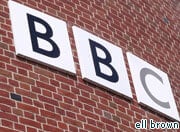Homosexuals and bisexuals should be portrayed more frequently and more authentically on the BBC, according to a controversial new report commissioned by the broadcaster.
However, the report also revealed that almost one in five viewers is either “uncomfortable” or “very uncomfortable” with homosexual scenes.
It follows officials statistics released by the Government last week which showed that just one per cent of the population were homosexuals, and just 0.5 per cent of the population were bisexuals.
Realistic
The official report, entitled Portrayal of Lesbian, Gay and Bisexual People on the BBC, recommends that the corporation stop portraying stereotypes of homosexuals.
But according to the broadcasters own report more homosexual and bisexual viewers thought that the corporation’s portrayal of homosexuals was “realistic” than “stereotypical”.
The report also showed that two thirds of viewers would be uncomfortable with watching a sex scene between two men before the 9pm watershed, and almost half said that they would rather not see two men kiss.
Uncomfortable
Even after the watershed more than one in five viewers, some 21 per cent, said they were uncomfortable with seeing two men holding hands.
The report also revealed that many of the people who are “uncomfortable” with homosexual scenes were concerned about the impact which they could have on their children.
The report said that they “felt that if lesbians, gays and bisexual people were regularly portrayed, and especially if portrayed positively, this could present it as a valid lifestyle choice for their children”.
Kids
One respondent said: “I’m scared at what my kids are going to see when they are watching on their own. They are at an impressionable age”.
And another cautioned: “My children could be seeing this, grandchildren listening to this. It’s all encouraging it”.
Startlingly the report also claimed that those who were opposed to the portrayal of homosexuality “were driven by a lack of understanding”.
Homosexual
The report added: “Given their negativity in attitude with respect to the LGB communities, the uncomfortable heterosexual people could only but view the portrayal of LGB people through their negative attitudinal lens, and did not like having this challenged.”
But it also noted that those who were uncomfortable with showing homosexual relationships on air were concerned that the corporation “remains an impartial and trusted family media provider.”
The report concluded that “the clear majority of the UK population” either don’t feel strongly about or are comfortable with homosexuality.
Sex scenes
But Tim Davie, the BBC executive behind the report, said that the findings would not necessarily lead to more homosexual sex scenes.
He said: “This may be disappointing from some people’s perspective, but we’re not mandating any kind of quota and saying, ‘There must be more portrayal'”.
The research was commissioned by the BBC to “gain a deeper understanding of what all audiences thought about the way lesbian, gay, and bisexual people are portrayed” through its TV and radio output.
The report follows audience research which surveyed more than 2,000 members of the public, and a public consultation which received more than 9,400 responses.
Lobby
Earlier this year evidence emerged showing that a popular TV soap opera was using a storyline which mimicked the language and aims of homosexual lobby groups.
In Coronation Street a teenage character, who began following Christianity in 2009, embarked upon a lesbian relationship this year.
The actress who plays the lesbian character spoke about her role during a TV interview.
Lesbian
Her language echoed that of homosexual activists who are keen to downplay stories of people leaving the homosexual lifestyle.
Brooke Vincent was asked on ITV1′s This Morning programme whether the lesbian relationship of her character, Sophie, was “a phase she’s going through”.
But Miss Vincent said it was not a phase. She commented: “In the story conference and everything, they wanted to make out that it wasn’t a phase because it’s not a phase to most people”.
Stereotype
The actress continued: “We wanted to play it really real and just normal.” She said: “You have a stereotype of what a lesbian is and it’s not always like that”.
In 2008 it was disclosed that popular TV programmes like EastEnders and Coronation Street were being actively lobbied to push a politically-correct view of modern Britain.
Stonewall, the homosexual campaign group, boasted about getting a character from Hollyoaks to wear a homosexual campaign T-shirt.
Hollyoaks
“One of our key priorities is to promote fair coverage of lesbian and gay people in the media and we work with programme makers to reflect this,” said Gary Nunn, a communications officer at Stonewall.
“A recent example of this is our work with Hollyoaks where the character Kris Fisher wore a T-shirt with our campaign slogan: ‘Some people are gay. Get over it!'”.
Last week it was revealed that just one adult in 100 is a homosexual.
The figure, from a vast survey of almost half a million adults carried out by the Office for National Statistics, also revealed that over 70 per cent of the population identify themselves as Christian.
The Integrated Household Survey, which analysed the responses of almost 450,000 adults, showed that just one per cent of the UK’s population are homosexuals, and just 0.5 per cent are bisexuals.

